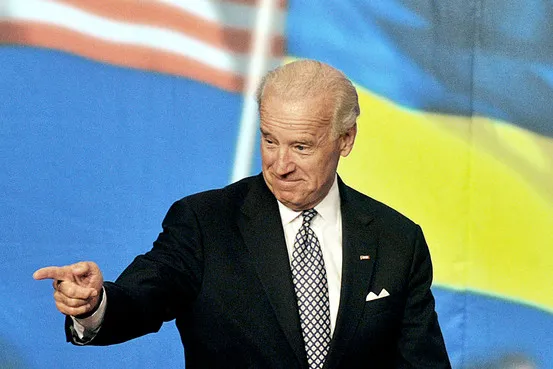
In een weinig diplomatiek interview met The Wall Street Journal heeft de Amerikaanse vice-president Joe Biden gezegd dat Rusland er zo slecht voor staat Moskou wel zal buigen in onderhandelingen met de Westen. Niet heel verwonderlijk is dat de Russen boos zijn, perplex zelfs, en uitleg eisen. In het interview zegt Biden onder meer: "Ze hebben een krimpende bevolking, ze hebben een verschrompelde economie, ze hebben een banksysteem dat de komende vijftien jaar niet zal overleven en ze zien dat de wereld voor hun ogen verandert en klampen zich vast aan het verleden." Het gevolg zal zijn dat Rusland wel concessies moet doen, zoals meer levensruimte bieden aan zijn buurlanden en zijn nucleaire wapenarsenaal inkrimpen. Biden voorspelt ook dat Rusland zich coöperatiever zal opstellen doordat Iran en Noord-Korea bezig zijn met een kernwapenprogramma. "Ik zie Poetin voor me als hij in Moskou zegt: 'Jezus Christus, Iran krijgt een atoombom. Wie gaat dan als eerste?" Dat is volgens Biden Moskou, en niet Washington.
"Russia has to make some very difficult, calculated decisions," Mr. Biden said. "They have a shrinking population base, they have a withering economy, they have a banking sector and structure that is not likely to be able to withstand the next 15 years, they're in a situation where the world is changing before them and they're clinging to something in the past that is not sustainable."

"Russia has to make some very difficult, calculated decisions," Mr. Biden said. "They have a shrinking population base, they have a withering economy, they have a banking sector and structure that is not likely to be able to withstand the next 15 years, they're in a situation where the world is changing before them and they're clinging to something in the past that is not sustainable."Mr. Biden's remarks were the most pointed to date by a senior administration official on why the Obama administration believes its "reset" with Russia is likely to succeed, while previous efforts to engage Moscow by the Clinton and Bush administrations ended with little progress.
The remarks also are among the administration's most critical of Russia's current role in the world, and come just weeks after President Barack Obama insisted that the U.S. seeks a "strong, peaceful and prosperous Russia" in an address at his high-profile July summit in Moscow with Russian President Dmitry Medvedev.
Natalya Timakova, a spokeswoman for Mr. Medvedev, declined to comment on Mr. Biden's remarks. Ms. Timakova acknowledged that the Russian government is currently looking at many of the issues he raised -- including economic challenges, the banking sector and the country's shrinking population.
Excerpts: Biden on Eastern Europe
“I can see Putin sitting in Moscow saying, 'Jesus Christ, Iran gets the nuclear weapon, who goes first?' Moscow, not Washington.” Read more interview excerpts
Despite Russia's economic and geopolitical difficulties, Mr. Biden said, Moscow could become more belligerent in the short term unless the U.S. continues to treat Russia as a major player on the international stage. He said Russian leaders are gradually beginning to grasp their diminished global role, but that the U.S. should be cautious not to overplay its advantage.
"It won't work if we go in and say: 'Hey, you need us, man; belly up to the bar and pay your dues,' " he said. "It is never smart to embarrass an individual or a country when they're dealing with significant loss of face. My dad used to put it another way: Never put another man in a corner where the only way out is over you."
Bron(nen): The Wall Street Journal The Wall Street Journal
POPULAIR NIEUWS

Waarom je een vol glas water bij de gootsteen moet zetten als je op vakantie gaat

Doorbraak in kwantumtechnologie kan laptops en telefoons duizend keer sneller maken

Veel ouders onderschatten hoe duur kinderen zijn, zeker in de vakantie

Solitaire mensen zijn heel intelligent en hebben de meest trouwe vrienden volgens een psycholoog

Wordt ChatGPT het nieuwe Google? De cijfers vertellen een ander verhaal
